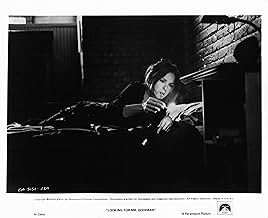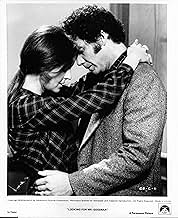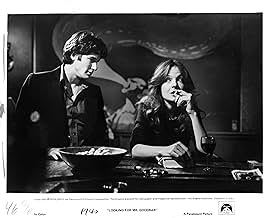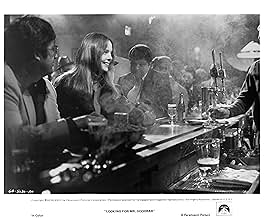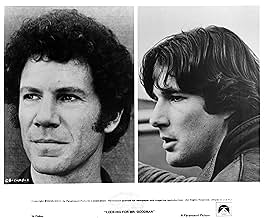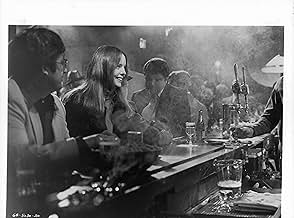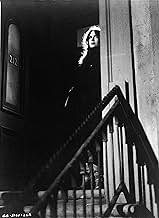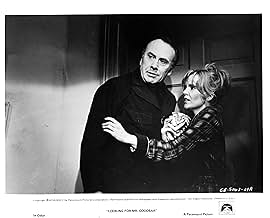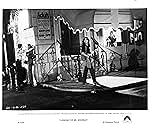IMDb रेटिंग
6.7/10
9.3 हज़ार
आपकी रेटिंग
एक समर्पित स्कूल शिक्षक अपनी रात बार में घूमते हुए यौन उत्पीड़न करने वाले ऐसे पुरुषों की तलाश करती है, जिनके साथ वह उत्तरोत्तर हिंसक होते हुये यौन सम्बन्धो में संलग्न हो सकती है.एक समर्पित स्कूल शिक्षक अपनी रात बार में घूमते हुए यौन उत्पीड़न करने वाले ऐसे पुरुषों की तलाश करती है, जिनके साथ वह उत्तरोत्तर हिंसक होते हुये यौन सम्बन्धो में संलग्न हो सकती है.एक समर्पित स्कूल शिक्षक अपनी रात बार में घूमते हुए यौन उत्पीड़न करने वाले ऐसे पुरुषों की तलाश करती है, जिनके साथ वह उत्तरोत्तर हिंसक होते हुये यौन सम्बन्धो में संलग्न हो सकती है.
- 2 ऑस्कर के लिए नामांकित
- 1 जीत और कुल 6 नामांकन
फ़ीचर्ड समीक्षाएं
Looking for Mr. Goodbar is directed by Richard Brooks and Brooks adapts the screenplay from the Judith Rossner novel of the same name. It stars Diane Keaton, Tuesday Weld, William Atherton, Richard Kiley, Richard Gere, Alan Feinstein and Tom Berenger. Music is by Artie Kane and cinematography by William A. Fraker.
Theresa Dunn (Keaton) is a dedicated schoolteacher to deaf children by day, but at night she cruises bars looking for abusive men with whom she can engage in progressively violent sexual encounters.
First off it should be noted that the Judith Rosner novel is based on the real life case of the 1973 murder of New York City schoolteacher Roseann Quinn. Also of note is that Rossner was not enamoured with this filmic adaptation.
What we have here is a tragic tale set in the promiscuous pre AIDS era of 1970s America. It's a bleak observation of the swinging singles scene of the era, providing caution of patriarch pressures, religious suffocation and the dangers of casual encounters for sexual gratification. Is it any wonder the big hitting critics of the time were nonplussed by it?...
The pic generated a lot of buzz for handsome new actor, Richard Gere, even if he does overact, it actually works in context to the brashness of the period. It also introduced Tom Berenger, in what is a frightening portrayal of a very sexually confused man. Tuesday Weld got a Best Supporting Actress Oscar nomination for playing Theresa's sister, which was richly deserved, so much so one wishes she was in the film more.
Yet it's Keaton who absolutely shines here, lifting an overlong picture to greater heights. Proving she had more in her armoury than merely playing kooks, Keaton imbues Theresa with a desperation and loneliness that is shattering for viewing purpose. The whole narrative bites with a crushing inevitability, that the nihilistic back drop can only bring pain and misery, and so it proves.
Richard Brooks should have sliced at lest thirty minutes from the run time, especially given that the "Theresa fantasy sequences" just come off as pointless and take one out of the heartbeat of the story. Yet this is still a fine movie, not one to be cheered up by of course, but poignant, relative and with the real life story at the core, important. 7/10
Theresa Dunn (Keaton) is a dedicated schoolteacher to deaf children by day, but at night she cruises bars looking for abusive men with whom she can engage in progressively violent sexual encounters.
First off it should be noted that the Judith Rosner novel is based on the real life case of the 1973 murder of New York City schoolteacher Roseann Quinn. Also of note is that Rossner was not enamoured with this filmic adaptation.
What we have here is a tragic tale set in the promiscuous pre AIDS era of 1970s America. It's a bleak observation of the swinging singles scene of the era, providing caution of patriarch pressures, religious suffocation and the dangers of casual encounters for sexual gratification. Is it any wonder the big hitting critics of the time were nonplussed by it?...
The pic generated a lot of buzz for handsome new actor, Richard Gere, even if he does overact, it actually works in context to the brashness of the period. It also introduced Tom Berenger, in what is a frightening portrayal of a very sexually confused man. Tuesday Weld got a Best Supporting Actress Oscar nomination for playing Theresa's sister, which was richly deserved, so much so one wishes she was in the film more.
Yet it's Keaton who absolutely shines here, lifting an overlong picture to greater heights. Proving she had more in her armoury than merely playing kooks, Keaton imbues Theresa with a desperation and loneliness that is shattering for viewing purpose. The whole narrative bites with a crushing inevitability, that the nihilistic back drop can only bring pain and misery, and so it proves.
Richard Brooks should have sliced at lest thirty minutes from the run time, especially given that the "Theresa fantasy sequences" just come off as pointless and take one out of the heartbeat of the story. Yet this is still a fine movie, not one to be cheered up by of course, but poignant, relative and with the real life story at the core, important. 7/10
I saw this movie when it came out in the '70's. Living in Marin County, we were all experimenting with our new freedom of sexuality, (Hot Tubs included). This movie should have been a wakeup call. But naive as I was, the night I saw the movie, my friend and I went to a local pub afterwards. I met a handsome fellow and he invited me to his home nearby, where he said he had a warm fire going. I told him of the movie and made him swear he wasn't a Mr. Goodbar (in a joking, yet serious way). But dummy me, I believed he was OK, and the man turned out to be someone you'd rather not go home with. Nothing too drastic happened, but I didn't go home with strangers again. I also became a "poster child" or should I say the voice of reason regarding the fact that "free love" was really not what we were looking for. Women are usually looking to be loved, and although we now had choices, this choice was a poor example of what we really needed.
Tonight my boyfriend and I were listening to Could It Be Magic by Barry Manilow, and I could picture the ending with that music playing and the lights flashing, and the rest of it which as you already know is unforgettable. So much so, that it's something I wouldn't want to see again. At my age now, it just might be a little too much for my heart to handle, LOL
Tonight my boyfriend and I were listening to Could It Be Magic by Barry Manilow, and I could picture the ending with that music playing and the lights flashing, and the rest of it which as you already know is unforgettable. So much so, that it's something I wouldn't want to see again. At my age now, it just might be a little too much for my heart to handle, LOL
Few viewers can deny the impact of this film on the '77 crowd and generations afterwards. As a curious 8-year-old up late watching HBO, I never forgot the story or the lesson. Based on a true story, Richard Brooks astutely translated Judith Rossner's best-selling novel to screen, choosing a luminous Diane Keaton, hot off `Annie Hall' and `The Godfather' to play Theresa Dunn, an up-and-coming Richard Gere, a quirky Tuesday Weld , and amazing Richard Kiley as Dunn, the overbearing Irish-Catholic father. The misogynistic Richard Atherton and an ominous Tom Berenger rounds out the solid cast.
Neither traditionally beautiful like her stewardess sister, Katherine or a baby factory like her other sister living at home with her, Theresa is the odd one out, the sister who is searching for approval from a father who barely acknowledges her existence. Childhood traumas mold her and make the fact that Theresa allows herself to be strong and fallible all the more powerful and endearing.
Tired of her father's unyielding rule, Theresa moves into the apartment building owned by Katherine's next attempt at a husband. As the women's freedom movement is underway, Theresa is caught in the position of questioning the traditional roles for women, roles against a new woman in control of her body and her sexuality. By day she teaches at a school for the deaf. By night her nightly jaunts into New York's seamier nightlife scene, expose the dichotomy of being a professional woman by day who must maintain credibility and responsibility, especially with young children while trying to be sexually active, experimental and suffering the stigma attached to both as whore and as a free woman wanting purely physical experiences much the same as men, yet realizing the label is different.
Throughout this film, Brooks explores Theresa's perpetual search for acceptance by men but a need to maintain her own identity. From a failed affair with a Prof. she was a TA to, to her fling with Tony, a local hustler, Theresa is perpetually in question of her sexuality and her allure for men, making poor choices in her partners only to endure their violence and possessiveness - much like her father. That she meets up with a homicidal drifter the New Year's Eve night she has decided to quit drugs and cruising, is the irony of her self-discovery.
The only positive male in her life appears to be is LaVar Burton's character, Cap Jackson, the sullen brother of one of Theresa's students. He is the only male presence in the movie that is not malevolent or trying to extract something from Theresa and during her altercation with Tony at the school, he is the only person to defend and protect her.
While the scare of AIDS stole later generations' promiscuity, this tale still resonates for viewers, especially for women on their own, looking for intimacy yet craving isolation.
While the ending tends to drag with one too many drug scenes the movie still packs a wallop for a finale.
Neither traditionally beautiful like her stewardess sister, Katherine or a baby factory like her other sister living at home with her, Theresa is the odd one out, the sister who is searching for approval from a father who barely acknowledges her existence. Childhood traumas mold her and make the fact that Theresa allows herself to be strong and fallible all the more powerful and endearing.
Tired of her father's unyielding rule, Theresa moves into the apartment building owned by Katherine's next attempt at a husband. As the women's freedom movement is underway, Theresa is caught in the position of questioning the traditional roles for women, roles against a new woman in control of her body and her sexuality. By day she teaches at a school for the deaf. By night her nightly jaunts into New York's seamier nightlife scene, expose the dichotomy of being a professional woman by day who must maintain credibility and responsibility, especially with young children while trying to be sexually active, experimental and suffering the stigma attached to both as whore and as a free woman wanting purely physical experiences much the same as men, yet realizing the label is different.
Throughout this film, Brooks explores Theresa's perpetual search for acceptance by men but a need to maintain her own identity. From a failed affair with a Prof. she was a TA to, to her fling with Tony, a local hustler, Theresa is perpetually in question of her sexuality and her allure for men, making poor choices in her partners only to endure their violence and possessiveness - much like her father. That she meets up with a homicidal drifter the New Year's Eve night she has decided to quit drugs and cruising, is the irony of her self-discovery.
The only positive male in her life appears to be is LaVar Burton's character, Cap Jackson, the sullen brother of one of Theresa's students. He is the only male presence in the movie that is not malevolent or trying to extract something from Theresa and during her altercation with Tony at the school, he is the only person to defend and protect her.
While the scare of AIDS stole later generations' promiscuity, this tale still resonates for viewers, especially for women on their own, looking for intimacy yet craving isolation.
While the ending tends to drag with one too many drug scenes the movie still packs a wallop for a finale.
The movie really gets the whole 1970s drug sniffing, gay liberation, pro swinger pre aids lifestyle down, and then closes with what may be one of the most depressing endings ever shot for a movie. As we all know, Diane Keaton is the straight laced teacher by day, and bar hopper by night. Her Catholic background and domineering father all contribute to her rampant promiscuity, and she ends up paying for it in the end. Sad, because the sexual revolution of the time gave women the right to do what she does in the film without being called whores, and then she had to pay for it. Such a good flick though, although it could have used a little editing for time. See it, and decide for yourself. Highly recommended, and perfect depiction of a life that really is impossible to imagine in this day and age.
Will they PLEASE release this on DVD! As of now, it's only available on PAN/SCAN VHS. ....Diane Keaton reinvents herself, going astray from her Annie Hall persona. Her character is complex and it's entertaining to watch her evolve or de-evolve. The mood is classic gritty 70's. Sometimes funny, sometimes sexy, sometimes bleak. ...The ending is of course what will stick with you forever. It's hard to tell what director Richard Brooks wanted to say with this, but none the less, it's a good ride. Highly recommended. Apparently it created quite a stir when it came out, and even today, critics like Leonard Maltin still bring it down saying it's lewd and pointless. You be the judge. Like it or not it's still a good period piece, showing the seedier side of one young woman's life in the city. I can't wait to get this and watch it again -- if the studio ever gets the nerve to release it. I give it a good 9/10.
क्या आपको पता है
- ट्रिवियाTom Berenger admitted in an interview that he had nightmares after he was finished shooting all of his scenes as Gary.
- गूफ़Theresa is supposed to be a first-grade teacher, but all her students look to be way older. The youngest seem to be 9 or 10 while the oldest could be 12, 13 or even older.
- क्रेज़ी क्रेडिटThe Paramount logo is shortened at both ends, fading in at the point the text already appears. It was gray-scaled in the closing version.
- कनेक्शनFeatured in Sex, Censorship and the Silver Screen: Forward Into the Past (1996)
- साउंडट्रैकTry Me, I Know We Can Make It
Written by Donna Summer (uncredited), Giorgio Moroder (uncredited) and Pete Bellotte (uncredited)
Performed by Donna Summer
Courtesy of Casablanca Record & FilmWorks
टॉप पसंद
रेटिंग देने के लिए साइन-इन करें और वैयक्तिकृत सुझावों के लिए वॉचलिस्ट करें
- How long is Looking for Mr. Goodbar?Alexa द्वारा संचालित
विवरण
बॉक्स ऑफ़िस
- US और कनाडा में सकल
- $2,25,12,655
- US और कनाडा में पहले सप्ताह में कुल कमाई
- $15,40,635
- 23 अक्तू॰ 1977
- दुनिया भर में सकल
- $2,25,12,655
- चलने की अवधि2 घंटे 16 मिनट
- ध्वनि मिश्रण
- पक्ष अनुपात
- 1.85 : 1
इस पेज में योगदान दें
किसी बदलाव का सुझाव दें या अनुपलब्ध कॉन्टेंट जोड़ें



